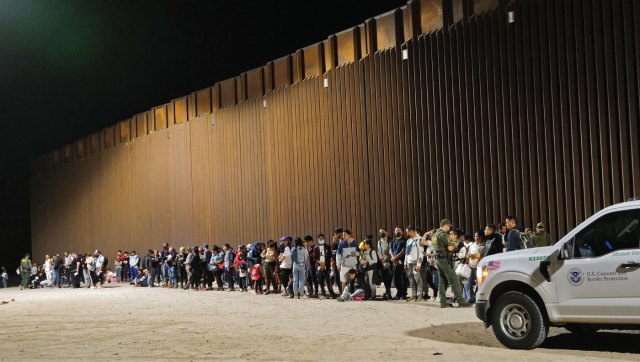
Republicans and Democrats differ over the most pressing priorities for the nation’s immigration system. Republicans place particular importance on border security and deportations of immigrants who are in the country illegally, while Democrats place greater importance on paths to legal status for those who entered the country illegally – especially those who entered as children, according to a new Pew Research Center survey.
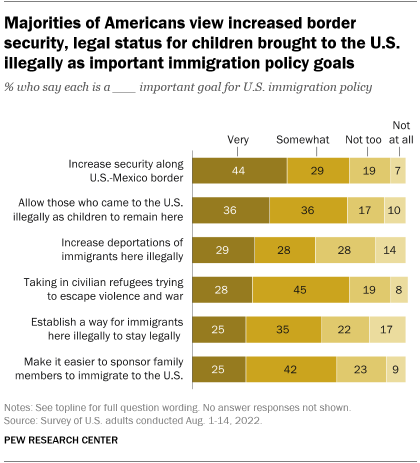
Still, there are some areas of overlap between Republicans and Democrats, and there are sizable ideological differences in immigration goals within each partisan coalition, with conservative Republicans and liberal Democrats expressing more intense views than others in their parties.
As the number of people apprehended for illegally crossing the southern border has reached record annual levels, about three-quarters of Americans (73%) say increasing security along the U.S.-Mexico border to reduce illegal crossings should be a very (44%) or somewhat (29%) important goal of U.S. immigration policy. Nearly all Republicans and Republican-leaning independents (91%) say border security should be an important goal, while a smaller majority of Democrats and Democratic leaners (59%) say the same, according to the survey of 7,647 U.S. adults conducted Aug. 1 to 14.
Pew Research Center conducted this study to understand the public’s policy priorities and goals for the U.S. immigration system. For this analysis, we surveyed 7,647 adults from Aug. 1-14, 2022. The survey was primarily conducted on the Center’s nationally representative American Trends Panel, with an oversample of Hispanic adults from Ipsos’ KnowledgePanel.
Respondents on both panels are recruited through national, random sampling of residential addresses. This way nearly all U.S. adults have a chance of selection. The survey is weighted to be representative of the U.S. adult population by gender, race, ethnicity, partisan affiliation, education and other categories. See the Methodology section for additional details. Read more about the ATP’s methodology.
Here are the questions used for the report, along with responses, and its methodology.
Majorities of Americans also say taking in civilian refugees from countries where people are trying to escape violence and war (72%) and allowing immigrants who came to the country illegally as children to remain in the U.S. and apply for legal status (72%) should be important goals for the immigration system. Each of these priorities garners more support from Democrats than Republicans.
About two-thirds of the public (66%) wants the immigration system to make it easier for U.S. citizens and legal residents to sponsor family members to immigrate to the U.S., while six-in-ten say establishing a way for most immigrants currently in the country illegally to stay legally should be an important immigration policy goal. A similar share (57%) says that increasing deportations of immigrants currently in the country illegally should be a very or somewhat important goal of U.S. immigration policy.
Wide partisan and ideological differences on immigration policy
For every policy asked about in the survey, there are sizable partisan differences in perceived importance. Still, for many policies included in the survey, majorities in both parties say it should be at least a somewhat important goal.
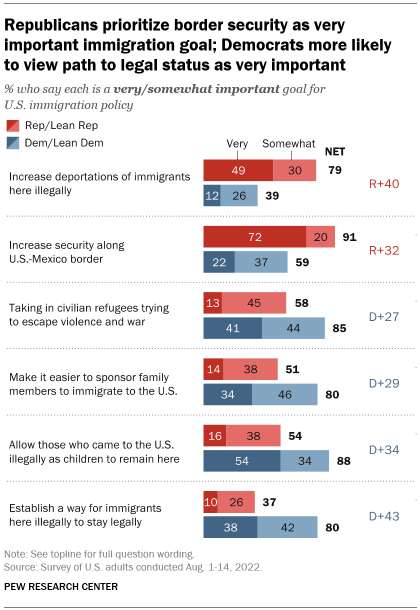
About nine-in-ten Republicans and Republican-leaning independents (91%) call increasing security along the U.S.-Mexico border an important goal, including 72% who say it should be a very important goal.
While a majority of Democrats and Democratic leaners (59%) say border security should be at least somewhat important, just 22% view this as very important – 50 percentage points less than the share of Republicans who say this.
About eight-in-ten Republicans (79%) say increasing deportations of immigrants currently in the country illegally is important, with nearly half (49%) calling it very important. By comparison, 39% of Democrats view increasing deportations as very or somewhat important, including just 12% who see it as very important.
Democrats are more likely than Republicans (80% vs. 37%) to say that establishing a way for most immigrants currently in the country illegally to stay in the U.S. legally is an important goal for the nation’s immigration system. About four-in-ten Democrats (38%) view this as a very important goal, compared with 10% of Republicans.
Majorities in both parties say that taking in refugees from countries where people are fleeing war and violence is an important goal. Nonetheless, more Democrats than Republicans view it as important (85% vs. 58%). Around four-in-ten Democrats (41%) say that taking in refugees is very important, while just 13% of Republicans say the same.
Conservative Republicans are the most likely to express strong support for more restrictive immigration goals such as increased border security and increased deportations, even when compared with others in their party. Liberal Democrats, by contrast, are the least supportive of these restrictive goals while being the most supportive of establishing a path to legalization for undocumented immigrants in the country.
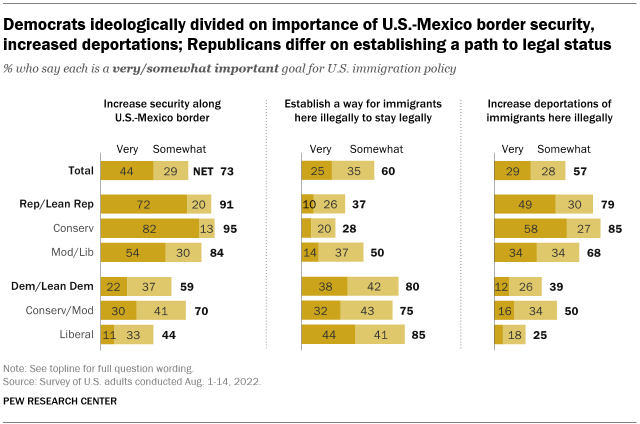
Around eight-in-ten conservative Republicans (82%) say increased border security should be a very important goal for U.S. immigration policy; about half of moderates and liberals in the GOP (54%) say the same. Similarly, about six-in-ten conservative Republicans (58%) say increasing deportations of immigrants currently in the country illegally should be a very important goal, compared with about a third of moderate and liberal Republicans (34%). (Conservative Republicans account for about six-in-ten of those who identify with or lean toward the GOP.)
Among Democrats, conservatives and moderates are more likely than liberals to say more restrictive goals are very or somewhat important to U.S. immigration policy. Seven-in-ten conservative and moderate Democrats say increasing border security should be a very or somewhat important goal, compared with 44% of liberal Democrats. Conservative and moderate Democrats are also twice as likely as liberal Democrats (50% vs. 25%) to say increasing deportations should be an important goal.
Liberal Democrats are the most supportive of creating a way for most undocumented immigrants to stay in the country legally: 85% say this should be an important goal, including 44% who say it should very important. Three-quarters of conservative and moderate Democrats see this as an important goal, including 32% who see it as very important. Among Republicans, half of moderates and liberals say a path to legal status should be an important goal, while only about three-in-ten conservatives (28%) say the same.
Modest changes in views of U.S. immigration policy
Many of the public’s views about immigration policy goals have been largely stable over the past few years. For example, views on taking in refugees are roughly the same as in 2019, and views on allowing immigrants who came to the U.S. illegally as children to apply for legal status are largely unchanged from 2016. There has been a modest increase in the share of Americans who say increasing deportations of immigrations here illegally should be a very or somewhat important goal (57% today vs. 54% in 2019).
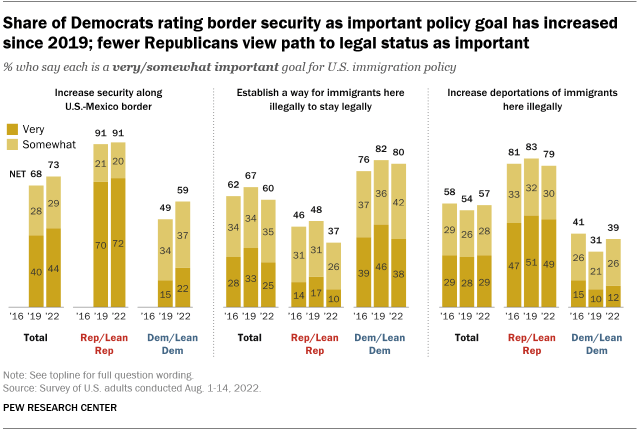
There has been a 5 percentage point increase in the share of the public who say increasing security along the U.S.-Mexico border to reduce illegal crossings should be an important goal (73% today vs. 68% three years ago). This increase is largely driven by a 10-point increase in the share of Democrats who say this (59% today vs. 49% then).
Support for a pathway to legal status for most immigrants currently in the country illegally has declined over the past three years. Today, six-in-ten adults say this should be an important goal, down from 67% in 2019 and similar to the share who said this in 2016 (62%). The decline reflects a decrease among Republicans – especially conservative Republicans. In 2019, about half of Republicans (48%) said this should be an important goal; today, just 37% say the same.
Note: Here are the questions used for the report, along with responses, and its methodology.

